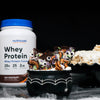What Can the Mushroom of Immortality Do for You?

Reishi (also known as lingzhi) is a fan-shaped mushroom which thrives in hot, humid environments. It is common to many areas in Asia where it’s been used as a natural anti-aging remedy for more than 2000 years. For this reason, reishi was anciently known as the “mushroom of immortality.”
In that time, reishi mushrooms were revered for their tonifying effects, enhancing vital energy, strengthening, cardiac function, increasing memory, and anti-aging effects.
So what does the science say about reishi mushrooms and how they can help you?
Benefits of Reishi Mushrooms
Immunity Boost
Most of Reishi mushroom’s immune system benefits can be traced back to its ability to regulate inflammation and neutralize reactive oxygen species.
Inflammation is part of our body’s natural response to damage. However, when inflammation continues after the damage has been repaired, this chronic inflammation can result in damage to healthy cells, tissues, and organs.
Likewise, free radicals can damage cells by destabilizing them. It is through the work of antioxidants (like the ones found in reishi) that free radicals are neutralized in the body and prevented from doing further harm.
As we age, the antioxidant defense system in our body becomes less effective at neutralizing free radicals. The disruption of this balance leads to oxidative damage to our cells and is a contributing factor to the physical and mental deterioration seen in aging.
May Help Fight Cancer
Research suggests that while reishi mushrooms are not an effective primary treatment for cancer, there is potential for its use as a supplement to more conventional treatments. One study noted its “potential for enhancing tumor response and stimulating host immunity” with regards to cancer treatment.

Reishi is also able to increase the activity of “natural killer cells” which are a type of white blood cell that respond to tumor formation. Test tube studies have shown that reishi mushroom to be effective in killing cancer cells, however human trials have yielded mixed results.
May Reduce Fatigue and Depression
While not quite the nootropic as some other mushrooms like lion’s mane, reishi does appear to have some positive effects on brain function.
One study performed showed that reishi was able to produce antidepressant effects in rats.

Another study involving women suffering from fibromyalgia discovered a distinct trend of improved happiness and satisfaction with life along with reduced depression in those treated with reishi.
Another study looked at 48 women with breast cancer. After 4 weeks of treatment, they reported significant improvements in physical well-being and fatigue.
How to Use Reishi Mushrooms
The most common forms for reishi mushroom supplements are capsules and powders. Taking reishi capsules is as simple as downing them with a glass of water. The same can be done with powder, but many people like to mix things up.
A quick internet search will come up with hundreds of different recipes for cooking homemade meals using reishi powder. It is also a common additive to coffee and tea.
For most powders, one scoop should be plenty, but always be certain to consult the label first to be sure.
The Bottom Line
Besides the benefits above, reishi mushroom is also used for improving heart health, managing blood sugar, and to reduce anxiety. However, these effects still require more research to truly confirm or deny.
You may also notice reishi as an ingredient in skin care products thanks to its antioxidant properties.
Unfortunately, a true “immortality mushroom” doesn’t exist. We should all focus on living as healthily as we can and make the most out of the gift of life!
Sources
https://www.ncbi.nlm.nih.gov/pmc/articles/PMC5758346/
https://www.ncbi.nlm.nih.gov/books/NBK92757/
https://www.ncbi.nlm.nih.gov/pmc/articles/PMC3585368/
https://www.ncbi.nlm.nih.gov/pmc/articles/PMC3879659/
https://pubmed.ncbi.nlm.nih.gov/33265969/
https://pubmed.ncbi.nlm.nih.gov/12916709/
https://pubmed.ncbi.nlm.nih.gov/27045603/
-
Posted in
Immune Support, Mental Health











